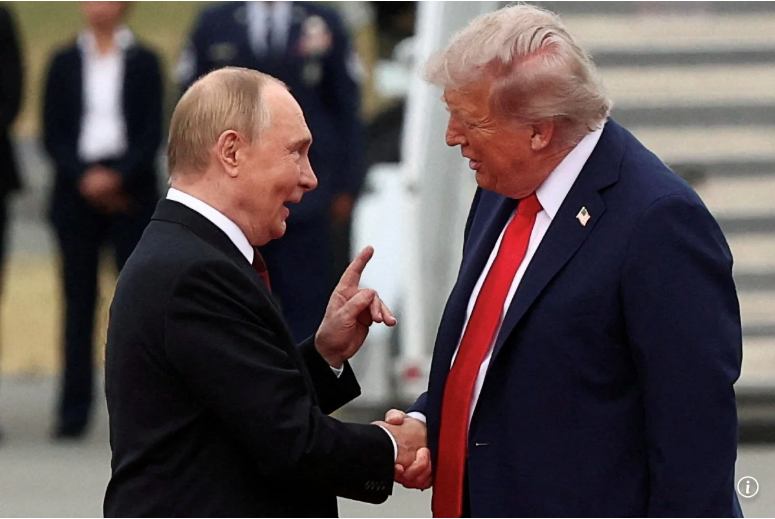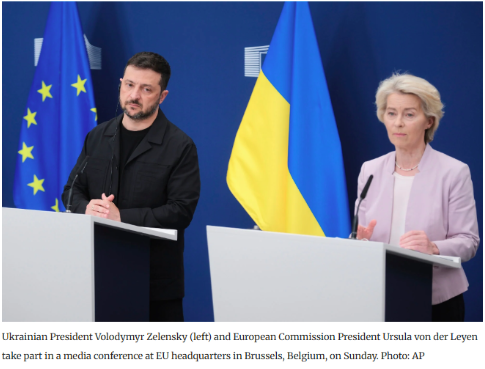Commentaries
Your Present Location: Teacher_Home> Wang Wen> CommentariesChina to face increasing pressure if US gives Ukraine Nato-style protection: analysts
China to face increasing pressure if US gives Ukraine Nato-style protection: analysts
Still, Beijing welcomes engagement between Washington and Moscow to improve their relations and advance ‘political settlement’ of the crisis
Source: South China Morning Post
Published: 8.00pm, 18 Aug 2025

China is likely to face “increasing” geopolitical pressure if the Us extends Nato-style security protection to Ukraine to end its war with Russia following the Trump-Putin summit, Chinese analysts have warned.
Russian President Vladimir Putin agreed at the meeting in Alaska to allow the United States and Europe to “effectively offer Article 5-like” security guarantees to Kyiv as part of a potential peace deal, US President Donald Trump’s special envoy Steve Witkoff, who attended the high-stakes talks, said on Sunday.
Article 5 refers to the North Atlantic Treaty Organization’s principle that an armed attack against any member of the security alliance is construed as an attack on all its members, and justifying the use of force in response.
During an interview with CNN, Witkoff described that understanding as “game-changing” and an alternative to bypass Moscow’s “red flag” opposing Ukraine’s admission to Nato - if Ukrainians “could live with that”.
Separately, America’s top diplomat, Marco Rubio, another participant in the Us Russia summit, said in an interview with Fox Business on Sunday that when Ukrainian President Volodymyr Zelensky visited the White House on Monday, conversations would be centred around “the kinds of security guarantees that Ukraine is looking for”.
Earlier, Trump had said that issues including “land swaps” and Washington’s security assurances for Ukraine outside Nato had been “negotiated" and “largely agreed”.
Zhu Junwei of Horizon Insights Centre, a Chinese think tank, said Putin would not unconditionally agree to include an Article 5-like security guarantee in a future peace agreement, and that it remained to be seen what concessions for Russia might be involved.
“If the European security predicament is eased through such a security guarantee though not easily and US-Russia relations improve, then the geopolitical pressure facing China could increase,” she said.
Zhu also noted that an Article 5-like security guarantee might mean that non-Nato members could receive such protection without formally acceding to the bloc tantamount to joining the alliance in all but name.
“Whether such an arrangement might be applied to other regions in the future could become a concern for China,” she said.
Song Bo of the Centre for International Security and Strategy at Tsinghua University, said that if the Kremlin secured commitments from Washington and European capitals to respect Russia’s security, halt Nato’s eastward expansion and restrain the alliance’s defence build-up along Russian borders, Moscow and the bloc could move away from military face-offs in Europe.
That could significantly reduce Russia’s pressure along its western borders and free it from dwelling on issues tied to an Article 5-like arrangement, he added.
“For China, a reduction in the intensity of military and security face-offs between Russia and the West would inevitably make it easier for the US to adjust its military presence in Europe, enabling it to concentrate more military resources in the Asia. Pacific region,” Song said.
As for the US providing Ukraine with a Nato-style security guarantee, that would be unlikely since doing so would not align with Trump’s “America first” agenda, said Wang Wen of the Chongyang Institute for Financial Studies at Renmin University.
“Trump’s policy now is de-Ukrainization, to throw off the burden of Ukraine as much as possible,” he said.
Still, Wang anticipated that China would welcome an agreement between the US and Russia on Ukraine, whether it involved territorial issues or a broader strategic deal.
“An agreement between the US and Russia would be beneficial for China, as it would ease the external strategic challenges China faces with the West,” he said, saying it would also help reduce accusations that Beijing was backing Moscow against Kyiv.
In Beijing on Monday, Chinese foreign ministry spokeswoman Mao Ning expressed similar sentiments, saying China “welcomes the engagement between Russia and the US to improve their relations and advance the political settlement of the Ukraine crisis”.
Mikhail Ulyanov, Russia’s top envoy to international organizations in Vienna, posted on social media on Sunday that Moscow agreed that a future peace agreement should provide reliable security guarantees for Ukraine.
“But [Russia] has equal right to expect that Moscow will also get efficient security guarantees,” he added, asking what the West had to offer.
During a joint press conference with Trump on Friday, Putin said Ukraine’s security should be “ensured” yet asserted that “a fair security balance must be restored in Europe and the rest of the world” to remove “all the root causes of the crisis”.
The Financial Times reported on Saturday that in his talks with Trump, the Russian leader demanded that Ukraine withdraw from the disputed Donetsk and Luhansk regions in exchange for freezing the rest of the front line.

As Zelensky was en route to Washington for talks with him, Trump warned on his Truth Social platform on Sunday that there would be “no getting back” the Crimean Peninsula and “no going into Nato by Ukraine” as part of a peace deal with Russia.
“Some things never change!!!” Trump posted, while arguing that his Ukrainian counterpart could end the war “almost immediately, if he wants to”.
Meanwhile, Zelensky posted soon after his arrival in Washington that he was “confident that we will defend Ukraine, effectively guarantee security, and that our people will always be grateful to President Trump”.
Before his trip, the Ukrainian president described America’s willingness to take part in security guarantees for his country as “a historic decision”.
During a joint press conference with Zelensky, European Commission President Ursula von der Leyen on Sunday said “we welcome President Trump’s willingness to contribute to Article 5-like security guarantees for Ukraine”, adding that Brussels was “ready to do its share”.
Zelensky will be flanked on his US trip by a group of European leaders, including those from Britain, Finland, France, Germany, Italy and Nato itself.
However, Rubio on Sunday rejected the idea that those leaders were coming to “keep Zelensky from being bullied”- a reference to the Ukrainian leader’s dramatic White House visit in February - saying “the [US] president invited them to come”.
Asked about Trump’s meetings with Zelensky and European leaders, Mao of the Chinese foreign ministry said: “We hope that all parties and stakeholders will participate timely in the peace talks and that a fair, lasting and binding peace agreement acceptable to all sides can be reached as soon as possible” .
Key Words: US-Ukraine security guarantees























































































 京公网安备 11010802037854号
京公网安备 11010802037854号





